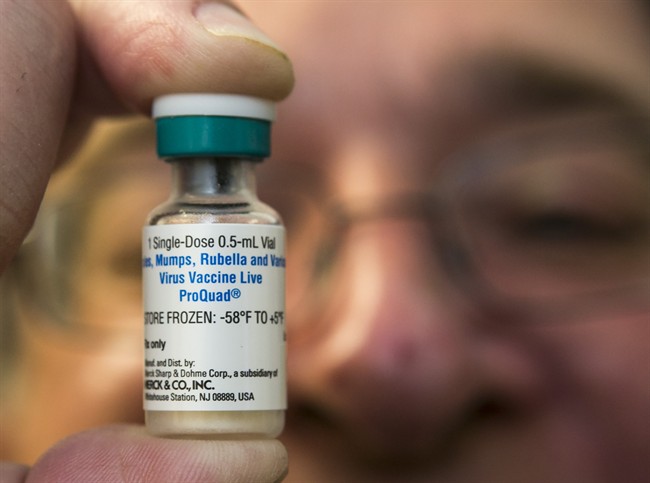TORONTO – As measles outbreaks make their way around Canada and the United States, health officials are urging parents to vaccinate their kids.

They also throw around the term “herd immunity,” which is when enough people are vaccinated against a disease, such as the highly contagious measles, to keep it from spreading.
READ MORE: Why is measles so contagious? 5 things you need to know
Here’s what you need to know about herd immunity, why it’s important and what levels of vaccination we should be reaching in Canada.
What is herd immunity?
Measles is highly contagious, and keep in mind, it’s completely preventable with vaccines. The virus – along with mumps, whooping cough and chicken pox – was virtually wiped out in North America.
But the virus is slowly resurfacing and doctors are pointing to one culprit: a steadily growing anti-vaccination movement in the U.S.
READ MORE: Anti-vaccination movement means preventable diseases making a comeback
Scientists say influenza typically spreads from one person to about two or three people. For measles, it’s closer to 10 and even up to 20 (if people aren’t vaccinated), according to Dr. Michael Gardam, chief of infectious disease control and prevention at the University Health Network.
- Canadian man dies during Texas Ironman event. His widow wants answers as to why
- Canadians more likely to eat food past best-before date. What are the risks?
- ‘Sciatica was gone’: hospital performs robot-assisted spinal surgery in Canadian first
- Treatment from female doctors leads to lower death rates, study finds
“If I had measles and was in a room with no ventilation and I left the room, you could bring someone in and the attack rate on that person would be 95 per cent,” Gardam explained.
If enough people are vaccinated though, it won’t matter if a single case of measles makes its way into a community. Most people would be protected against the disease and there’s little opportunity for an outbreak – that’s herd immunity.
READ MORE: Measles outbreak – 5 questions and answers
Jason Tetro, a Canadian microbiologist and author, uses an analogy of cattle. Say you have 100 cattle, and 95 are protected – the remaining five would be left unprotected but the chance of the virus circulating wouldn’t be high.
“Herd immunity essentially states that you have a sufficient number of people who are vaccinated to prevent an outbreak,” he explained.
Why is it important?
Herd immunity looks after the small number of people who aren’t eligible for the vaccine, such as infants, pregnant women or people with compromised health.
In Canada, the vaccination schedule looks like this: the first shot should be administered at 12 to 15 months of age, and again at the 18-month mark or at four to six years of age depending on your province or territory.
READ MORE: What’s in a measles vaccine? 4 things you need to know
The MMR vaccine shouldn’t be administered earlier because it may not be as effective. That also applies to babies and toddlers who aren’t at optimal health when it’s time for them to get their shot.
READ MORE: 6 vaccination myths debunked
“If you have any kind of compromised immune system, any kind of infection like a fever, you should talk with your doctor before you get the shot,” Tetro advised.
Pregnant women shouldn’t get the MMR vaccine because of a risk to their fetus. Instead, they should wait about 28 days after vaccination before conceiving, the CDC says.
READ MORE: Which Toronto schools have the lowest measles vaccination rates?
Finally, if you have egg allergies, consult with your doctor before getting the MMR vaccine. Because the viruses are grown in chick embryo cell cultures – like unhatched fertilized eggs – there’s a minute possibility of an allergic reaction.
If you have a respiratory illness, tuberculosis, leukemia lymphoma and HIV, for example, you wouldn’t be able to get the shot.
Herd immunity would protect these vulnerable groups who aren’t eligible for the vaccine.
How many of us should be vaccinated to reach herd immunity?
Canadian health officials are aiming for a herd immunity rate of 95 per cent, according to the Public Health Agency of Canada. The federal body says that’s the level at which there are enough people immunized to protect everyone.
Herd immunity varies by disease; for measles, it should be at about 95 per cent uptake for the two doses, said Dr. John Spika, director general of the public health agency’s centre for immunization and respiratory infectious diseases.
READ MORE: How should health officials reverse an anti-vaxxer movement?
In Canada, only one per cent of Canadians sampled refused immunization. Another four per cent hadn’t immunized their kids according to schedule.
carmen.chai@globalnews.ca
Follow @Carmen_Chai




Comments